When to Sick Crate chickens
Knowing when to sick crate chickens will help you to raise a healthier and hardier flock of birds. give hands-on care to a bird in need. When you can pull an injured or sick chicken out and away from the flock you can keep things from spreading.
This guide will help you to identify when a chicken needs your care and what you can do to help them get back on track with their health. Raising chickens that are healthy and happy will ensure you get amazing eggs each day from your backyard coop.
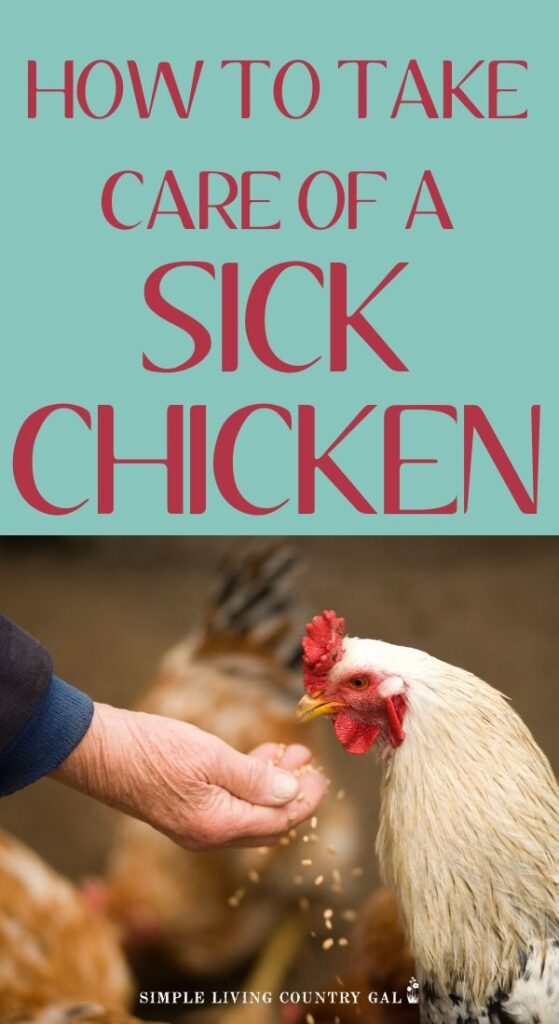
There is nothing quite as bad as having an animal that is sick or injured, but sometimes it can be tricky to catch. If we do not pay close attention, we may not even know there is an issue until it is too late.
Knowing your animals and how they behave is an important part of being a homesteader, so when the most subtle clue shows up, we are better able to catch it.
For example, when I went out to do chores this morning, I noticed something wasn’t right. As my chickens were jumping all over me in hopes of some food, one of my gals was off in the corner not even looking my way.
This is always the first sign that someone is sick on our homestead. Whether it be with our kids or with our animals, if they are not eating or acting normally, we know something is going on.
It always breaks my heart to find a sick animal and I often think how nice it would be to ask them what is wrong. Unfortunately, we can’t, which means we must investigate to find and treat what is wrong.
Protect Your Sick Bird
When you notice there is something wrong with your chicken, the first thing you should always do is remove it from the flock.
Chickens can be pretty brutal, especially to a member of the flock that is sick or injured. It is an instinct for them to push away any birds that are in poor health.
That means many times, chickens mask their symptoms from not only the flock but to you as well, many times not showing signs until it is too late.
How to Sick crate chickens
I find it is better to be safe than sorry, so if you notice even the slightest thing wrong with your chicken it is best to gather them up and put them in a crate or other container.
A sick crate is going to do two things.
- The small confined area helps them to feel relaxed allowing them to calm down.
- I can better look her over to see if there are other signs or symptoms.
Be sure to grab the FREE Chicken Health Checklist below!
What can you use as a sick crate for your chickens?
You can recycle what you have, purchase a new or used crate, or DIY a crate with a few simple supplies.
I prefer to use plastic pet carriers because they give privacy, have a solid floor that is easy to stand on, and are durable to last for many years.
On our homestead, we use two plastic pet carriers, a large one and a small one. I found them a few years ago at a garage sale, and even though they were in bad shape at the time, we were able to clean them up and have been using them for over ten years.
The small one is perfect for holding chickens, and the larger one is perfect for our baby goats.
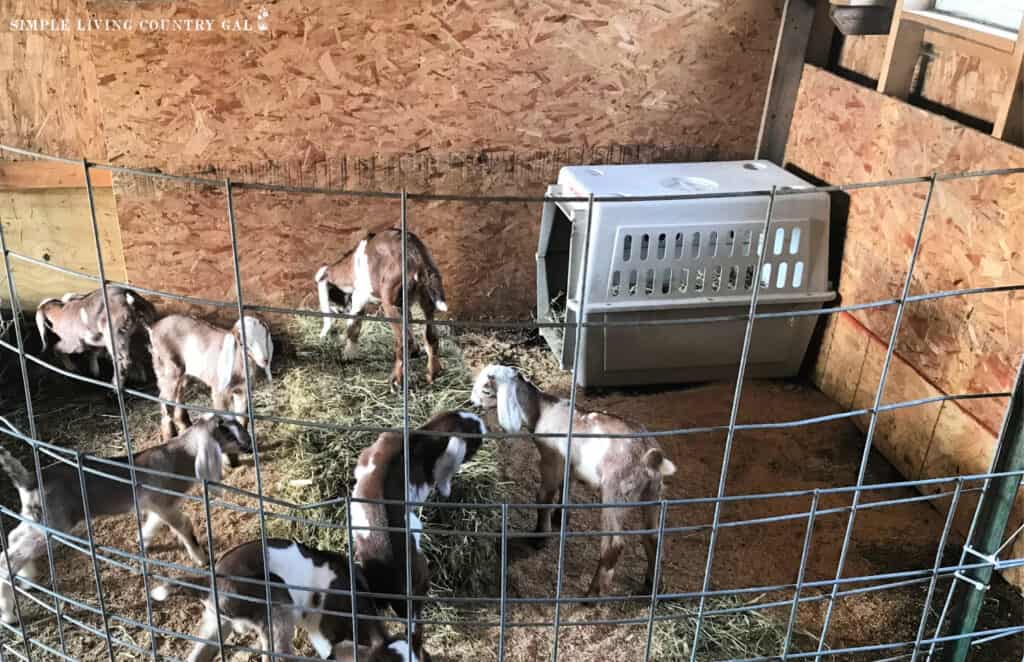
They are made of heavy plastic yet lightweight. The front has a metal hinged door, and the side has slats for airflow. You can remove the top, making it easy to clean in between uses.
These pet carriers are lightweight, making them easy to move, even if you have a chicken inside. This is important for me as I get older, and my body does not like to do things as easily as it once did.
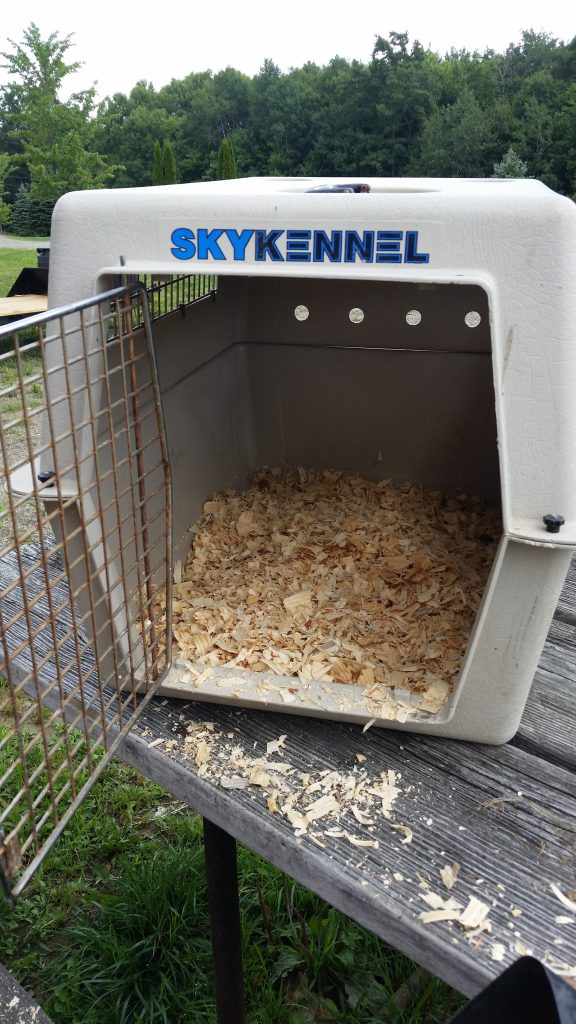
I see these at yard sales quite often for a fraction of what it would cost to purchase them brand-new. If you are out and see one, I suggest you grab it. It is better to have one of these crates on hand to be ready when needed.
What to have inside of a sick crate:
You will want to add a layer of bedding, such as straw or wood shavings. This will keep the floor from being too slippery and soak up any manure or urine.
Be sure to have water and feed inside using stable containers to prevent spilling. You can find dishes that attach to the wire to keep it up off of the ground where it can remain clean longer.
Can you make a chicken sick crate?
In a pinch, you can DIY a sick crate for your chickens using a few supplies you probably have on hand.
- Find a large sturdy cardboard box.
- Cut a large opening on one of the sides.
- Attach mesh netting or a piece of chicken wire to the opening. This will give your hen airflow and allow you to see them more easily.
- Duck tape the opening so your chicken stays securely inside.
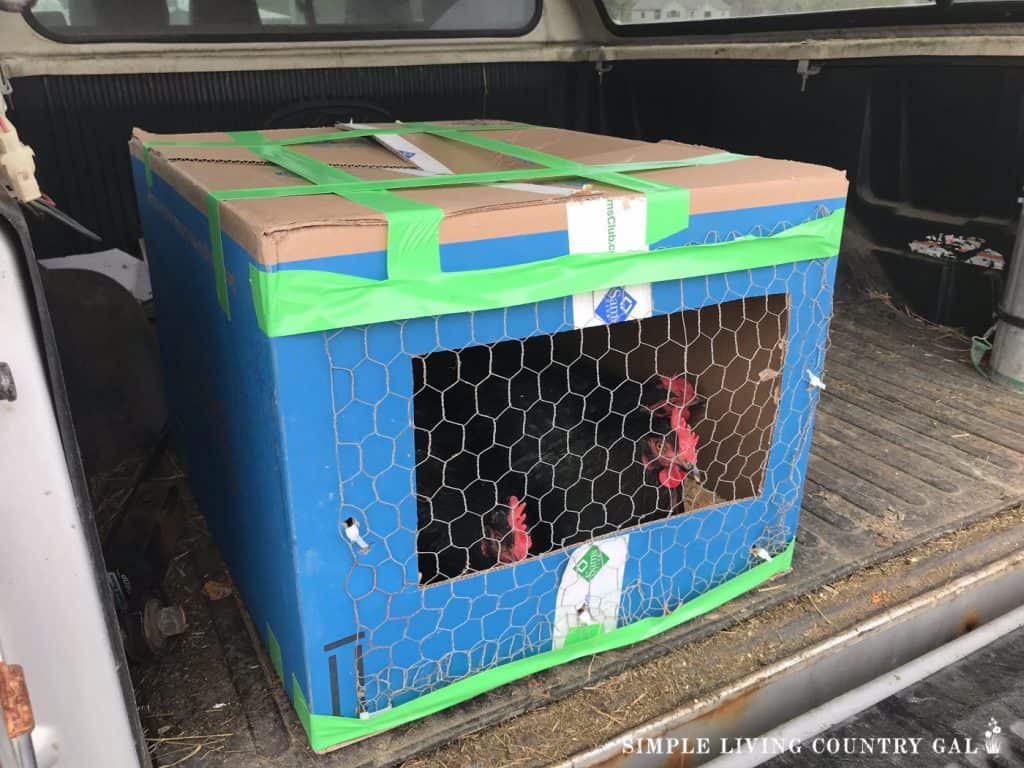
The good news about chickens is they will stay relatively calm in a small, enclosed area, meaning they will not try to force their way out.
Having a safe place to put your chicken will help you evaluate her more effectively, as well as allow your chicken to relax in a small, confined area. Also, the solitude and quiet of a recovery crate can be just what the doctor ordered. Rest and calm can help speed up your bird’s healing process.
How long should a chicken be crated?
You will want to keep a sick chicken crated until you see her improve to a point where she can be added back into the flock. This can take anywhere from a few hours to a few weeks. Monitor her daily, looking to see if she is eating, drinking, and having healthy poops.
Before adding her back into the flock, you may want to tag her so you can more easily pick her out, allowing you to check on her. We like to tie yarn loosely around the leg in a color that is easy for us to see but doesn’t stand out drastically.
You want a subtle color because chickens will peck at something different continuously, and they may do this if they see a bright red string on the leg of a flock member.
How to Grab A Chicken
If your chickens are not used to being handled, then grabbing them may be a bit tricky. The best way to do this is to sprinkle a few treats on the ground, such as meal worms, to distract them. Once you do, the easiest way to grab a chicken is to pick them up from behind.
Use both of your hands, placing them around their wings as you grab them. This will keep them from flapping their wings, which they do in defense.
Once you have them secured, turn them upside down in your arms. This will calm them down a bit and allow you to do a quick inspection.
While you are holding them, give a body condition assessment.
- Are they thin?
- Do they feel strong in your hands?
- Are they fighting you vigorously or just lying limp in your hands?
These questions will help you evaluate how seriously they are sick or injured and determine whether you need to call a vet.
SLCG Pro Tip: If you just grabbed your chicken and find that they are putting up little to no fight (and they are not tame), then you have an animal that is sicker than you may realize. Fight or flight is natural in all animals unless they are trained to trust you fully. A lethargic animal is a sign of an emergency, and you will want to intervene quickly.
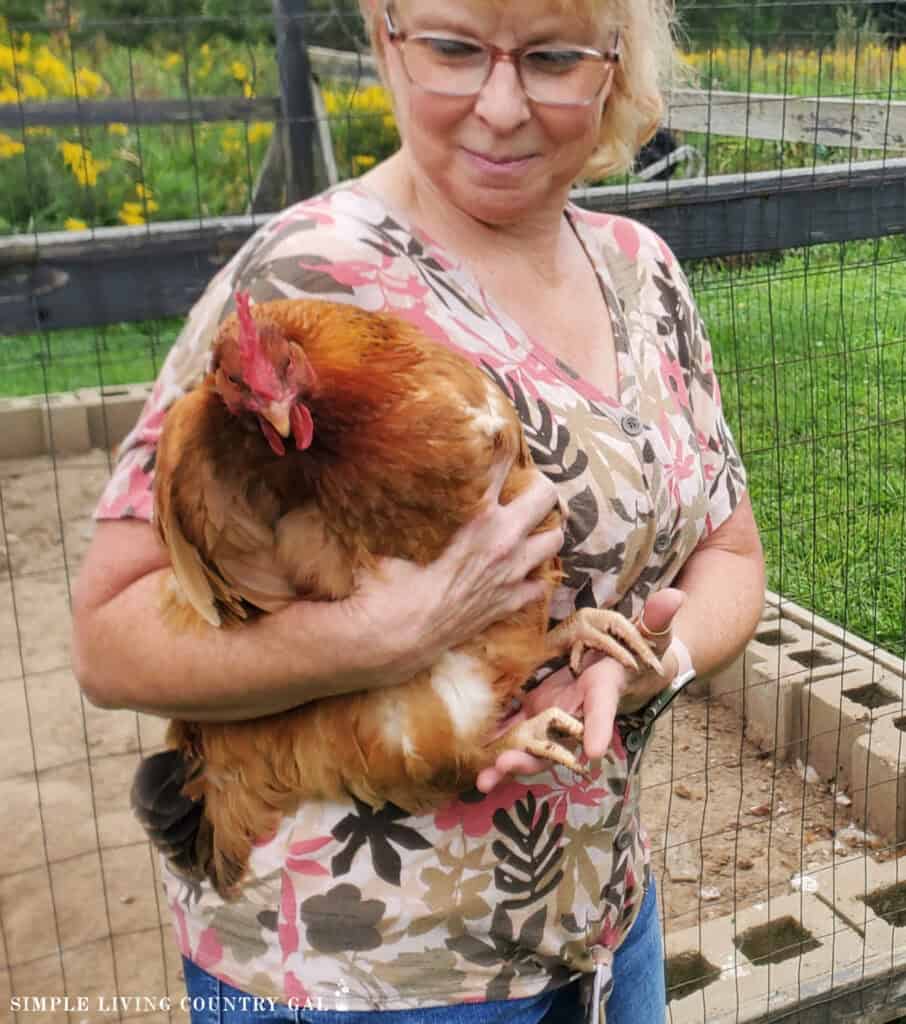
Sick crating your chicken.
Once you have your chicken and have given a good first assessment, gently place them inside of your sick chicken crate. Be sure to offer some food and water to see if she will take it. Let her sit and rest before you do any further care, as you do not want to stress her when you are trying to help.
Once she has had time to reset you can continue to evaluate the situation.
- Look for any injuries and treat them accordingly. Clean out and apply any medication to keep things from getting infected.
- If she has smelly or runny feces, you can get it tested so you know if you have worms to treat for.
- If she has labored breathing, she may have pneumonia or other lung infection.
- If her wattle and comb are grey or limp, she may be ill, overrun with parasites, or stressed. Continue to watch her for more clues.
- If she has a swollen or hard belly, she may be egg-bound. Call a vet for advice on what to do next.
Keep her in the crate until you are confident she is healed and/or recovered.
Watch things until you know you can safely add them back to the flock. Not all issues are death sentences. Sometimes, all a hen needs are a few days to recoup, and they are fine. As long as they are eating, drinking, have a healthy poo, and see no obvious injuries, you are good to go.
Vetrx Poultry Aid, 2 fl.oz




Sick Chicken Checklist
When you have chickens it is important to know your hens when they are healthy so you can more easily recognize when one is acting off.
Why is this important? Because many diseases that affect chickens tend to be contagious, and one sick chicken can quickly result in a flock of ill birds.
The best way to prevent an outbreak is to always be alert for any clues that there is something up with one or more of your chickens.
This is a list of things I watch for in my flock.
Just because you have a hen with one of these issues doesn’t mean she is sick or dying. It is simply a clue that you will want to watch for more issues or, at the very least, keep a close eye on her.
#1. Are all of your Chickens Eating?
When you are out feeding your chickens, watch how your chickens eat. Are your hens all eating like normal? Are they excited to see you and rush to the feeder when you fill it?
A chicken that is off their feed is always the very first sign there is something wrong. For this reason, I like to watch all of our animals as they are eating. I watch their behavior around the feeder and how they are eating. If anyone is not interested then I will watch them further.
What I mean by that is, that a chicken flock has a hierarchy and the more dominant hens will eat before the lower hens are allowed to come in. Give it a few minutes to see that everyone is getting food before you make a call.
Usually, it takes a bit for everyone to dive into their food, but as long as they do you should be okay.
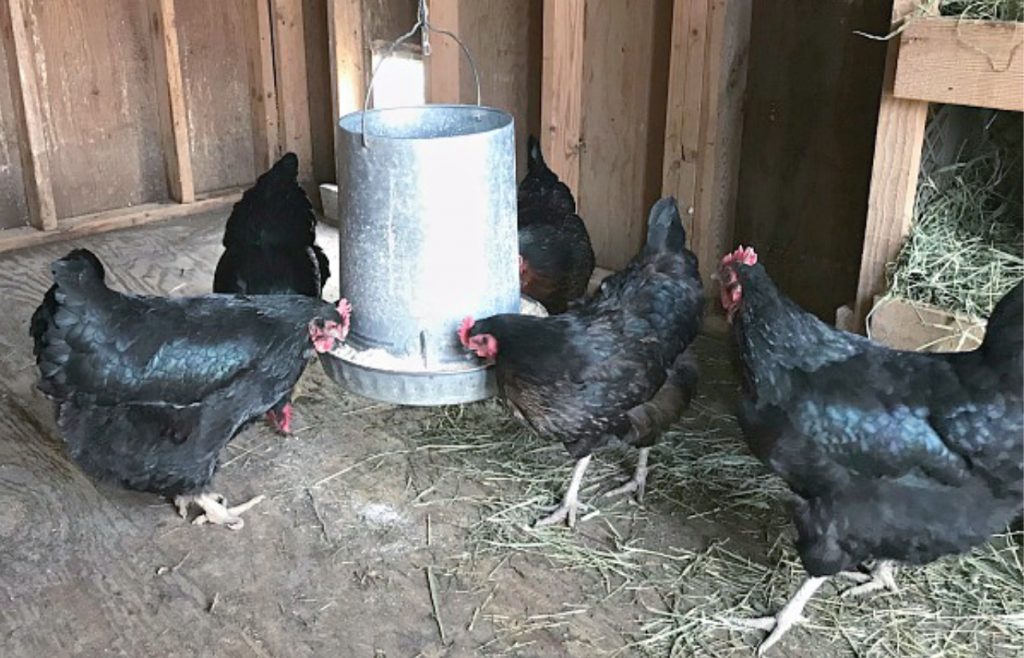
#2. Are all your Chickens Drinking?
If you find the water is just as full at the end of the day as it was, in the beginning, you may want to investigate further. This does not necessarily mean you have an issue with an illness but it may mean you have an issue with your water. By fixing the water you will keep any illnesses from occurring in the first place.
A good rule of thumb is to have enough water so your flock can find it whenever they are thirsty. Have a large waterer inside of the coop and one outside in the run as well. This is especially helpful on very hot summer days and if you have a large run or your hands free-range.
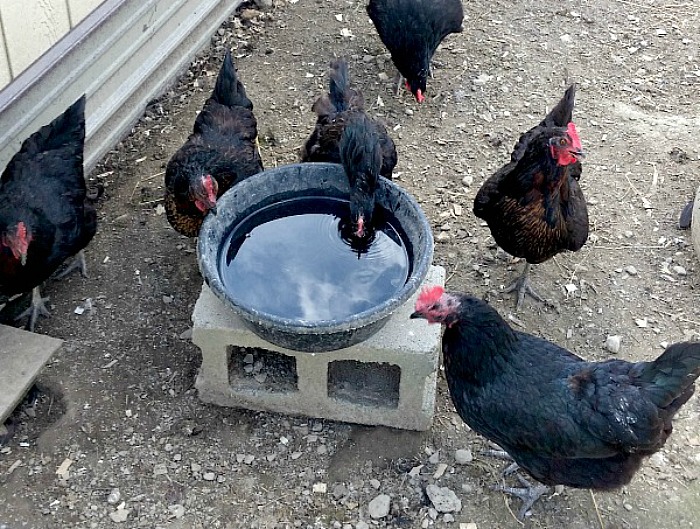
#3. Are your Chickens Acting Normal?
This may be the biggest clue that something if up, yet the most difficult to spot in a flock. This is why I encourage homesteaders to KNOW their animals. As you go about your daily chores and animal care, watch your animals.
Pay attention to how they walk, act, and behave in the flock. Listen to their chatter and their sound. Know what is normal behavior so you can more easily catch things when they are off.
Usually, the only clue you may have is their behavior, so pay attention to any differences no matter how subtle they are.
Chicken Care Calendar

#4. Does your chicken feel normal?
From the day you bring your baby chicks home, it is important that you handle them and often. This will help them to get used to you holding them and picking them up.
Get into the habit of holding a few of your hens each day. Feel them and pet them and ask yourself:
- . Are they a good healthy weight?
- Are their feathers thick and healthy?
- Is the color of their comb and wattle a nice red or pink, or is it dull and limp or purple?
All of these are signs you will want to watch out for.
A poor wattle and comb condition is a huge indicator that something is off with your chickens. Know the signs so you can catch things quickly. A wattle and comb can alert you if your chicken is stressed, overheated, healthy, or having a heart attack.
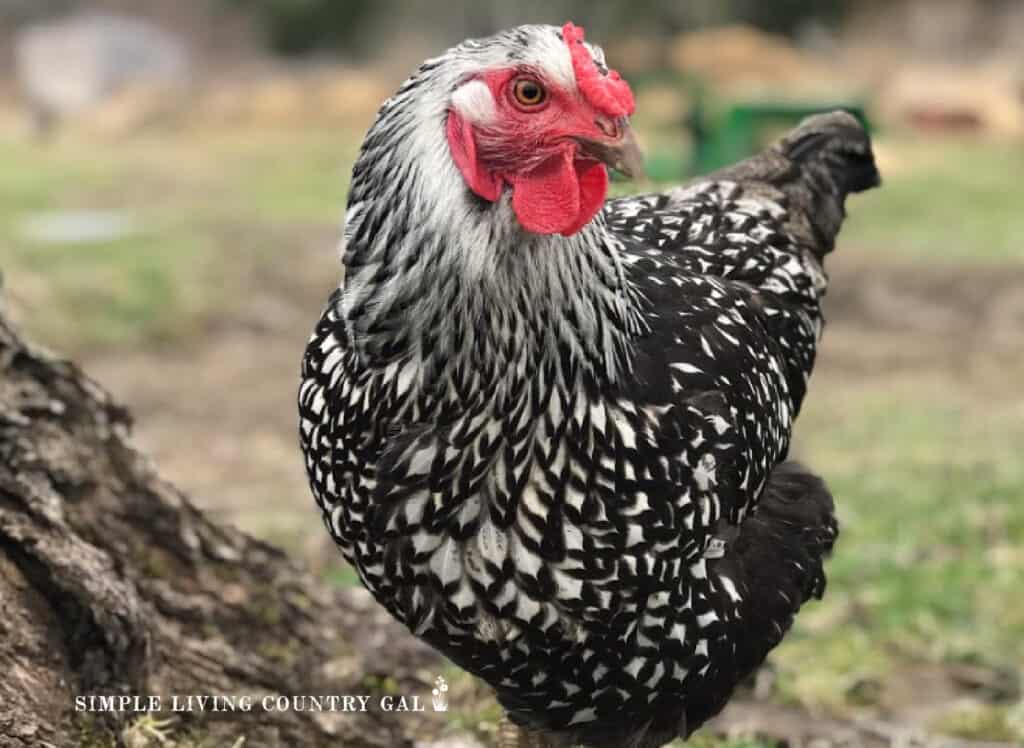
#5. Is your Chicken’s Poo Normal?
A more obvious warning sign with any animal is the sight of runny or foul-smelling poo. Every day get into the habit of walking your coop and chicken run.
Check the ground. If you see any of your birds defecate while you are there, take a quick look. This simple habit can help you stop a simple illness before it becomes a serious disease.
What diseases can you find with runny poo? Worms are the number one issue. Coccidia is common in chickens and something to be on the lookout for, as it can cause fatalities rather quickly.
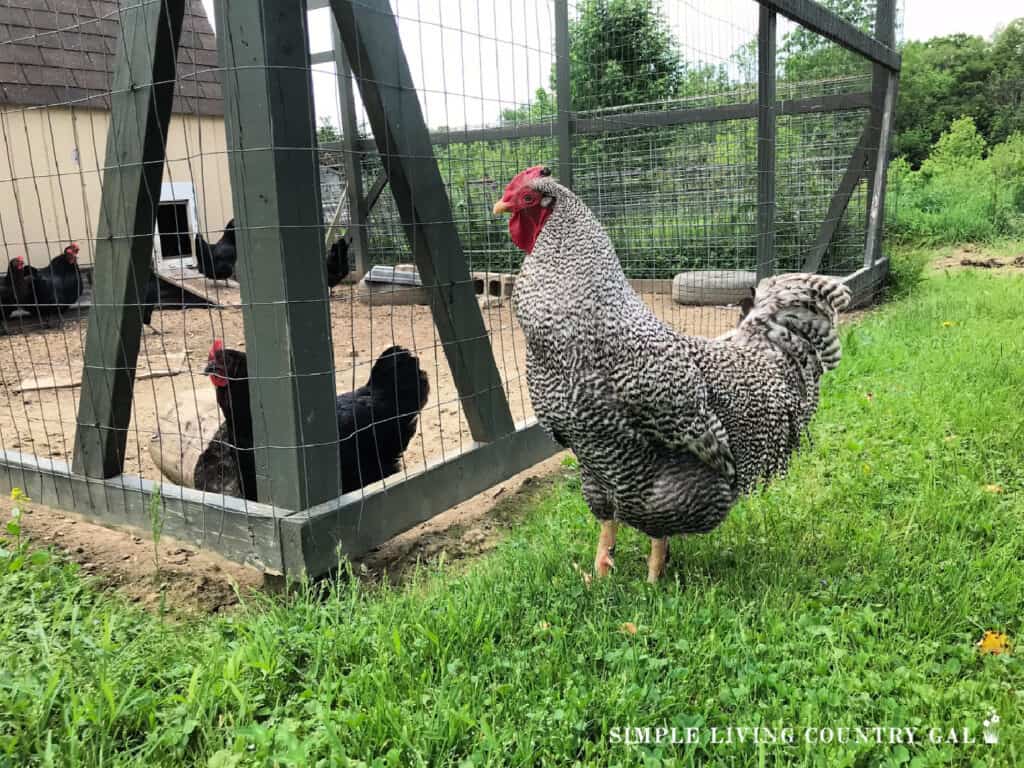
Do veterinarians treat poultry?
In most cases, sadly, the answer is no, but that doesn’t mean you can’t call for advice. I regularly call my vet to ask questions and get advice on how to help not only just our chickens but all of my livestock. Their tips could be the difference between life and death so reach out and ask.
If you do not have a vet to ask, then find a trusted farmer, a neighbor who has chickens, or someone online that you can ask for advice.
These relationships are so important to homesteaders, and having a list of numbers to call will help keep your flock healthy.
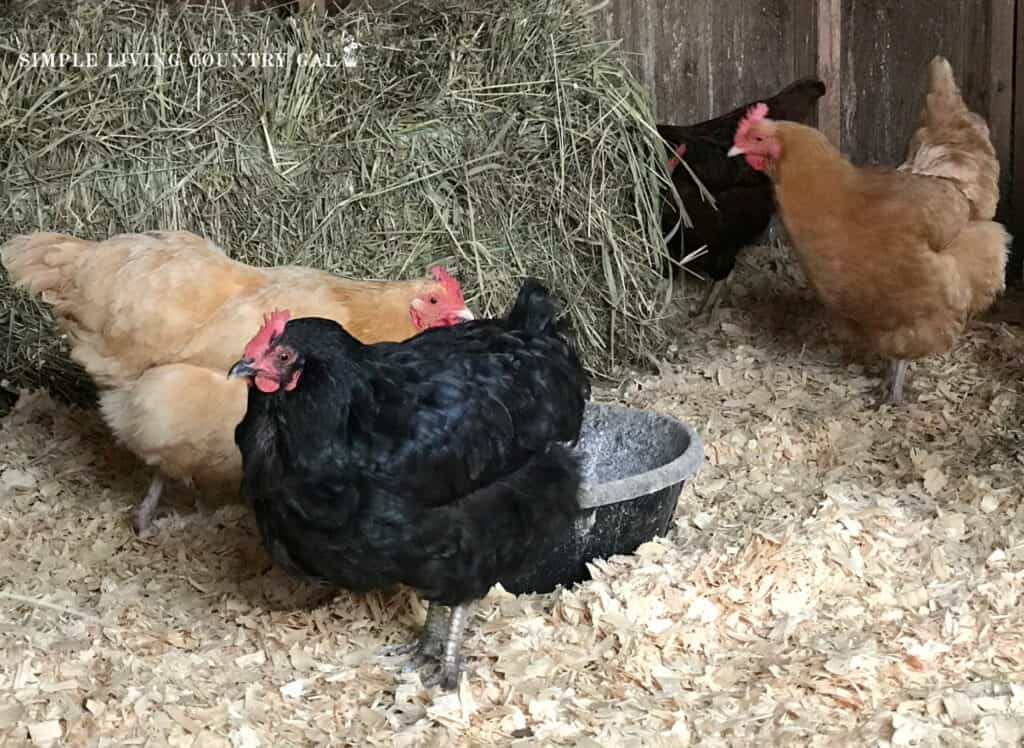
Please remember you are only asking for advice, and any decisions you ultimately make with your animals is up to you.
Returning a Hen to the Flock.
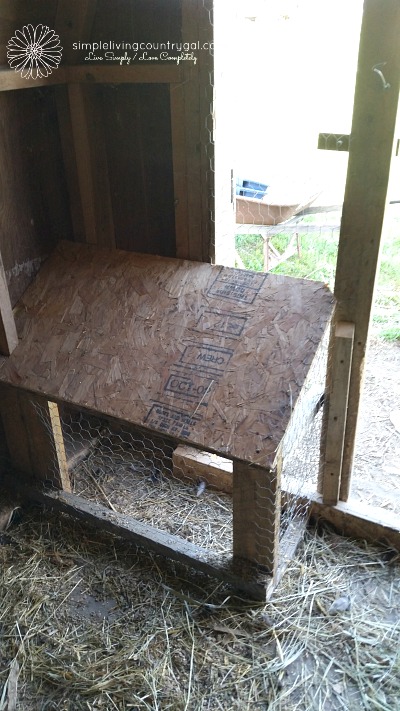
Sometimes if a hen is kept out of the flock for a long period of time, henpecking may occur when she reenters the flock. The best way to avoid this is to be sure she is fully recovered and add her back in when your hens are out of the coop. Be sure to watch her for any signs of henpecking so you can quickly intervene if needed.
If you have a separate area inside your coop, you can use that as well. These pens can work surprisingly well when incorporating not only a hen but also a new rooster.
Read How to Safely Add a Rooster to Your Hen House for more tips.
You can also add the hen back in at night. Birds have a short memory and may not even notice someone new has shown up come morning. Simply take your hen into the coop after dark and place her on the roost. By morning the entire flock will assume she was there all along and go about their business as usual.
When raising animals, I have found it is always better to raise healthy and happy livestock rather than having to deal with an outbreak. You can do this by offering healthy supplements such as apple cider vinegar, kelp, and organic fresh foods.
Another tip to remember is to be as hands-on as you are comfortable being from day one. This will help you to notice any issues before they get out of hand. Now that you have a guide on how to sick crate chickens as well as a checklist of symptoms and issues to watch for, you can relax knowing you are ready if any issues do come up.

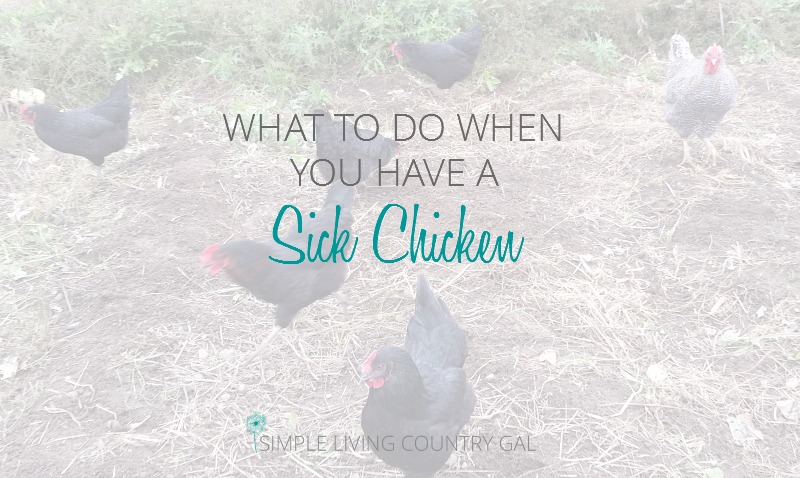






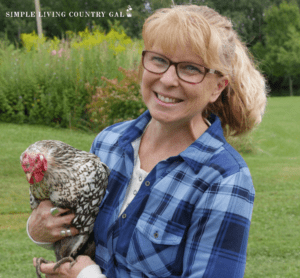



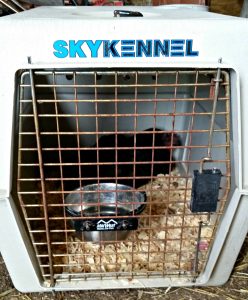
My chicken was broody for about 4 or 5 weeks; we didn’t have fertilised eggs. She then had a v quick moult and was walking funny, almost bald and getting pecked at. It was v cold so we put her under a lamp in the shed in a box by herself. I think she has got some respiratory problem as her breathing is noisy, I wonder if she caught a chill due to her fast moult. She is growing feathers back well and eating and drinking, but she walks as if drunk or possibly weak? I tried to get her out of the box which she didn’t like but she also tried to fly out which was an encouraging sign! Any idea what might be wrong? She’s been isolated since Sun 28th Nov
Hello, Clare,
I am so sorry your chicken is not feeling well.
Isolating her is the very best thing you can do. Keep her there until you know for sure she does not have anything catching to the other hens.
Keep giving her water, food, and warmth as she recovers. Her issue can be anything from a vitamin deficiency (very likely since she is molting and getting pecked at), an ear issue, or something more telling. The best thing you can do is keep her isolated until she improves or more symptoms show up.
remember, even if your vet is not skilling in chickens you can still call and talk to them for some advice on how to treat a condition. Such as ear or vitamin.
I hope this helps,
Tracy Lynn
I’m new to the chicken world. I have 5 chickens. Ages 13 and 11 weeks. They all seem well. I notice a have runny poop not from all but at least one is found it. What do I do??
Runny poo can be a change in diet. If you free range them, their poo can be loose depending on what they ate while they were out. If the poo is “slimy” and really foul smelling, you may want to look at a parasite cause.
Tracy Lynn